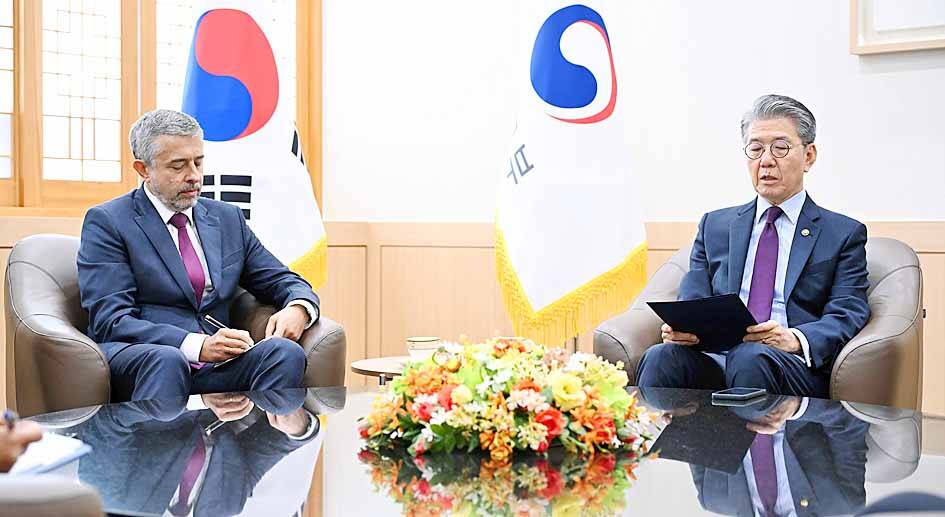South Korea yesterday demanded the immediate pullout of North Korean troops allegedly deployed in Russia as it summoned the Russian ambassador to protest deepening military cooperation between Pyongyang and Moscow.
South Korea’s spy agency on Friday last week said that it had confirmed that North Korea sent 1,500 special operation forces to Russia this month to support Moscow’s war against Ukraine.
Ukrainian President Volodymyr Zelenskiy earlier said his government had intelligence that 10,000 North Korean soldiers were being prepared to join invading Russian forces.

Photo: EPA-EFE
During a meeting with Russian Ambassador Georgy Zinoviev, South Korean Vice Minister of Foreign Affairs Kim Hong-kyun “condemned in the strongest terms” North Korea’s troop dispatch that he said poses “a grave security threat” to South Korea and the international community, the South Korean Ministry of Foreign Affairs said in a statement.
Kim said that South Korea in collaboration with the international community would mobilize all available means to deal with an act that threatens its vital national security interests, the statement said.
The Russian embassy quoted Zinoviev as saying that the cooperation between Russia and North Korean is not aimed against the security interests of South Korea.
In a telephone call with NATO Secretary-General Mark Rutte yesterday, South Korean President Yoon Suk-yeol said that Seoul would not sit idly by “reckless” military cooperation between Pyongyang and Moscow.
Yoon said South Korea would send a delegation to NATO to exchange information about Russian-North Korean cooperation, Yoon’s office said.
Rutte wrote on social media that North Korea possibly fighting alongside Russia would “mark a significant escalation.”
The US and NATO have not confirmed that North Korean troops were sent to Russia, but the reports of their presence have already stoked concerns in South Korea that Russia might provide North Korea with sophisticated technologies that can sharply enhance its nuclear and missile programs in return for its troop dispatch.
North Korea’s advancing nuclear arsenal is a major security threat to South Korea.
North Korean leader Kim Jong-un has taken steps to permanently terminate all relations with South Korea and has threatened to use nuclear weapons pre-emptively.
Some observers say South Korea would likely consider supplying weapons to Ukraine if Russian transfers of high-tech nuclear and missile technologies to North Korea are verified.
South Korea has joined US-led sanctions against Moscow over its invasion of Ukraine in February 2022, but it has not directly provided arms to Kyiv, citing its longstanding policy of not supplying weapons to nations actively engaged in conflicts.
Russia earlier denied using North Korean troops in its war with Ukraine. North Korea’s state media has not commented on the matter.
Ukrainian officials released a video allegedly showing North Korean troops lining up to collect Russian military clothes and bags at an unknown location. The Associated Press could not verify the footage independently.

MAKING WAVES: China’s maritime militia could become a nontraditional threat in war, clogging up shipping lanes to prevent US or Japanese intervention, a report said About 1,900 Chinese ships flying flags of convenience and fishing vessels that participated in China’s military exercises around Taiwan last month and in January have been listed for monitoring, Coast Guard Administration (CGA) Deputy Director-General Hsieh Ching-chin (謝慶欽) said yesterday. Following amendments to the Commercial Port Act (商港法) and the Law of Ships (船舶法) last month, the CGA can designate possible berthing areas or deny ports of call for vessels suspected of loitering around areas where undersea cables can be accessed, Oceans Affairs Council Minister Kuan Bi-ling (管碧玲) said. The list of suspected ships, originally 300, had risen to about 1,900 as

Japan’s strategic alliance with the US would collapse if Tokyo were to turn away from a conflict in Taiwan, Japanese Prime Minister Sanae Takaichi said yesterday, but distanced herself from previous comments that suggested a possible military response in such an event. Takaichi expressed her latest views on a nationally broadcast TV program late on Monday, where an opposition party leader criticized her for igniting tensions with China with the earlier remarks. Ties between Japan and China have sunk to the worst level in years after Takaichi said in November that a hypothetical Chinese attack on Taiwan could bring about a Japanese

Right-wing political scientist Laura Fernandez on Sunday won Costa Rica’s presidential election by a landslide, after promising to crack down on rising violence linked to the cocaine trade. Fernandez’s nearest rival, economist Alvaro Ramos, conceded defeat as results showed the ruling party far exceeding the threshold of 40 percent needed to avoid a runoff. With 94 percent of polling stations counted, the political heir of outgoing Costa Rican President Rodrigo Chaves had captured 48.3 percent of the vote compared with Ramos’ 33.4 percent, the Supreme Electoral Tribunal said. As soon as the first results were announced, members of Fernandez’s Sovereign People’s Party

MORE RESPONSIBILITY: Draftees would be expected to fight alongside professional soldiers, likely requiring the transformation of some training brigades into combat units The armed forces are to start incorporating new conscripts into combined arms brigades this year to enhance combat readiness, the Executive Yuan’s latest policy report said. The new policy would affect Taiwanese men entering the military for their compulsory service, which was extended to one year under reforms by then-president Tsai Ing-wen (蔡英文) in 2022. The conscripts would be trained to operate machine guns, uncrewed aerial vehicles, anti-tank guided missile launchers and Stinger air defense systems, the report said, adding that the basic training would be lengthened to eight weeks. After basic training, conscripts would be sorted into infantry battalions that would take